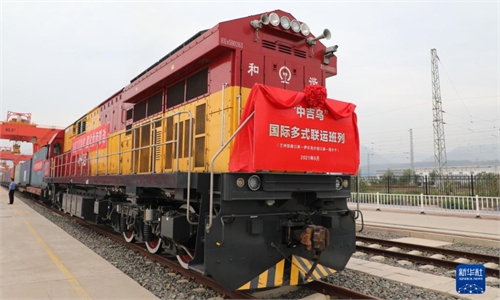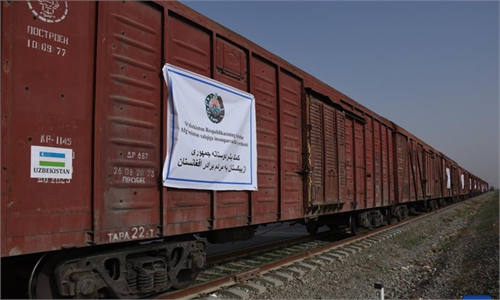
China and Kyrgyzstan Photo:VCG
At Kyrgyzstan's invitation, Chinese experts arrived in the Central Asian country on Tuesday and started survey work for the China-Kyrgyzstan-Uzbekistan railway, marking the start of the project's feasibility study, China's National Development and Reform Commission (NDRC) said on its official WeChat account.
Since the beginning of this year, the China-Kyrgyzstan-Uzbekistan railway project has made positive progress thanks to the joint efforts of the three countries, NDRC said.
During a recent round of visits in Central Asian countries, Chinese State Councilor and Foreign Minister Wang Yi held talks with Kyrgyz Foreign Minister Jeenbek Kulubaev on Saturday, and the two countries reached a consensus on jointly building a community with a shared future.
The two sides believe that the China-Kyrgyzstan-Uzbekistan railway is a strategic project for regional connectivity, and the time and conditions are becoming ripe for the launch of this important project, read a statement released by the Foreign Ministry on its website.
The construction of the railway is in line with the development needs of the countries involved. For instance, Kyrgyzstan has realized the importance of enhancing its role as a transportation junction in the region by shoring up railway connectivity, Zhu Yongbiao, a professor at the Research Center for the Belt and Road of Lanzhou University, told the Global Times on Tuesday.
With improved railway connectivity, it is not only the connection between China and countries along the route that will be strengthened; more importantly, interconnectivity between the Central Asian countries will be greatly increased as well, Zhu noted.
Another benefit will be the strong personnel and economic exchanges, which could help to ease disputes in politics and other aspects within the region, laying foundations for peaceful development, Zhu said.
Construction techniques and financing are currently not problems, Zhu noted. In the meantime, he pointed out that it may still take years to promote the construction since transnational cooperation projects need to deal with various challenges.
The overall potential of the project is huge, as it could be further extended to other countries in the future, such as Afghanistan. It will help to integrate the Central Asian region with the wider transportation network, and connect it better to the global market, he concluded.
Under the initial plan, the total length of the line will be 523 kilometers - 213 kilometers in China, 260 kilometers in Kyrgyzstan and 50 kilometers in Uzbekistan. The railway will be the shortest route to transport goods from China to Europe and the Middle East, cutting the journey by 900 kilometers and saving seven to eight days of travel time.
The railway will complete the southern passage of the New Eurasian Land Bridge, shaping a convenient transport path from East and Southeast Asia to Central and Western Asia, Northern Africa and Europe, according to reports. China-Europe freight train services have been expanding rapidly in recent years and boosting trade and economic exchanges in Eurasia.



